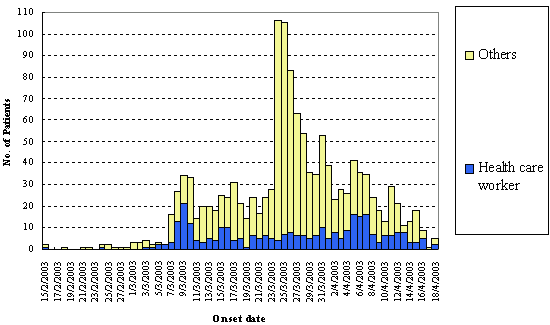|
SARS Bulletin (24 April 2003)
As at 23 April, a total of 1,458 patients have been admitted to public hospitals with the Severe Acute Respiratory Syndrome (SARS), in which 335 are health care workers or medical students. 2. A total of 522 of these SARS patients have recovered and been discharged from public hospitals. There are currently 831 SARS patients remaining in hospitals, in which 133 patients are undergoing convalescence before discharge and 110 patients are receiving treatment in the intensive care units. Most of the patients are showing positive responses to the new treatment protocol. There are a total of 105 fatal cases. 3. The epidemic curve of 23 April showing the dates of onset of 1,344 patients is as follows 1 -  4. Among these 1,344 patients with confirmed dates of onset, 23% are health care workers, including doctors (4%), nurses (13%) and other health care workers (6%). The distribution of patients who are health care workers by age group and gender is shown in the table below:
Home Confinement 5. At present, all household contacts of confirmed SARS patients are required to undergo home confinement for monitoring and treatment up to a maximum of 10 days. As at 23 April, a total of 787 persons (from 301 households) had been affected by this requirement, of whom 201 persons (from 70 households) were still under home confinement. Implementation of the home confinement arrangement has been smooth. So far, only 2 cases were referred to the Police for tracing of defaulters. 6. From 25 April, the Director of Health will also require all household contacts of suspected SARS patients to undergo home confinement. If household contacts of suspected patients can undergo confinement at an early stage, it would help to contain the spread of the disease. 7. Although this requirement may bring inconvenience to some families if it is later confirmed that the patients have not contracted the disease, it is necessary to broaden the coverage of home confinement to reduce the risk of the disease spreading to a minimum. The Government appeals to the community's understanding and forebearance to this measure.
Measure Body Temperature of Passengers 8. As part of the Government's strategies to contain the spread of SARS, with effect from 0000 hrs of 24 April, all inbound and transit passengers arriving at the Hong Kong International Airport are required to have their body temperature taken. This measure follows a successful pilot scheme that was conducted between 21 and 23 April. Under this pilot scheme, a total of 4,318 passengers and crews were checked and none of them was found to have fever of over 38 degree Celsius. 9. At present, all outbound passengers departing at the Hong Kong International Airport are already required to have their body temperature taken. As at 23 April, no one among the 67,464 persons departed from the airport was suspected to have SARS. 10. The Department of Health (DH) has also started measuring the body temperature of inbound passengers arriving in Hong Kong via Hung Hom and Lo Wu with effect from 0600 hrs of 24 April. Under this measure, members of the Civil Aid Service are responsible for taking the body temperature of the travellers. The Immigration Department and relevant parties are also providing support and assistance. Those found to be suspected of SARS would be referred to hospitals for further management.
Prevention of Respiratory Tract Infections in Schools and Pre-school Institutions 11. Child Care Centres / Kindergartens / Schools are advised to refer to the "Guidelines on Prevention of Communicable Diseases in Child Care Centres / Kindergartens / Schools" published by DH in 2000 for general information on the prevention of communicable diseases in school and institutional settings. This is downloadable from the Internet (http://www.info.gov.hk/dh/diseases/guide-e.htm). Specific advice in the school and institutional settings that helps to prevent respiratory tract infections includes :
Further Information 12. To empower the public in fighting against the SARS, DH has also issued advices and guidelines on prevention of the disease for various sectors. Health education information is available on the 24-hour pre-recorded hotlines (2833 0111) and has been uploaded onto DH's homepage (http://www.info.gov.hk/dh). A hotline (187 2222) has also been provided for public enquiries.
1 The dates of onset of the remaining 114 cases are to be confirmed. |